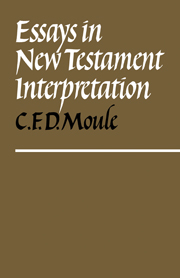Book contents
- Frontmatter
- Contents
- Foreword
- Acknowledgements
- Abbreviations
- Jesus in early Christian interpretation
- Studies in the Gospels
- Two studies in the Epistles
- Two linguistic studies
- 10 Death ‘to sin’, ‘to law’ and ‘to the world’: a note on certain datives
- 11 Peculiarities in the language of II Corinthians
- Studies exegetical, doctrinal and ethical
- Index
11 - Peculiarities in the language of II Corinthians
Published online by Cambridge University Press: 05 November 2011
- Frontmatter
- Contents
- Foreword
- Acknowledgements
- Abbreviations
- Jesus in early Christian interpretation
- Studies in the Gospels
- Two studies in the Epistles
- Two linguistic studies
- 10 Death ‘to sin’, ‘to law’ and ‘to the world’: a note on certain datives
- 11 Peculiarities in the language of II Corinthians
- Studies exegetical, doctrinal and ethical
- Index
Summary
This short note is, at best, of minor importance; but I offer it, with admiration, congratulations, and affection, to a scholar who, in the midst of important and influential studies, is not above enjoying a digression after something of sheer curiosity.
II Cor. viii contains a number of sentences without any main verb, including at least one which uses a participle – the δεόμενοι of ν. 4 – in lieu of an indicative.
Now, Rom. xii contains, as is well known, a large number of sentences without a main verb, involving the use of two adjectives and some seventeen participles (not to mention two infinitives) where one would expect imperatives. The same ‘imperatival’ participles and adjectives are found also in I Peter several times, and occasionally elsewhere in the New Testament; and a classic article by D. Daube showed, as against J. H. Moulton's claim that it was a genuine Hellenistic idiom, that, in all probability, it was not native to koine but was derived from a Tannaitic usage, by which general injunctions are expressed by participles.
In II Cor. viii itself, there seems to be an instance of the imperatival participle, namely, the ὲνδεικνύμενοι of v. 24. Daube (‘Participle and Imperative’, 481) thinks that AB may be right in reading ἐνδείξασθε but this is surely an obvious correction (in mss. which do tend to contain intelligent ‘improvements’) of an original difficilior lectio.
- Type
- Chapter
- Information
- Essays in New Testament Interpretation , pp. 158 - 162Publisher: Cambridge University PressPrint publication year: 1982

